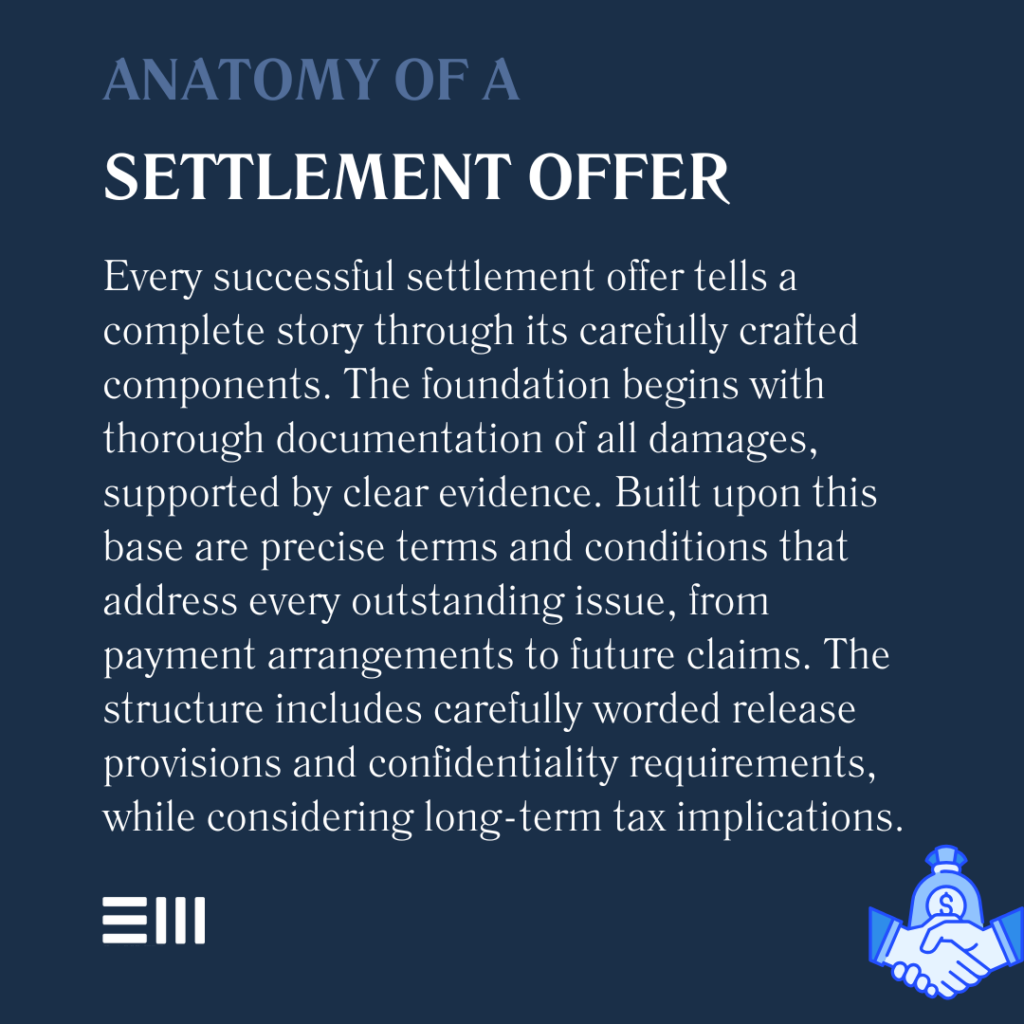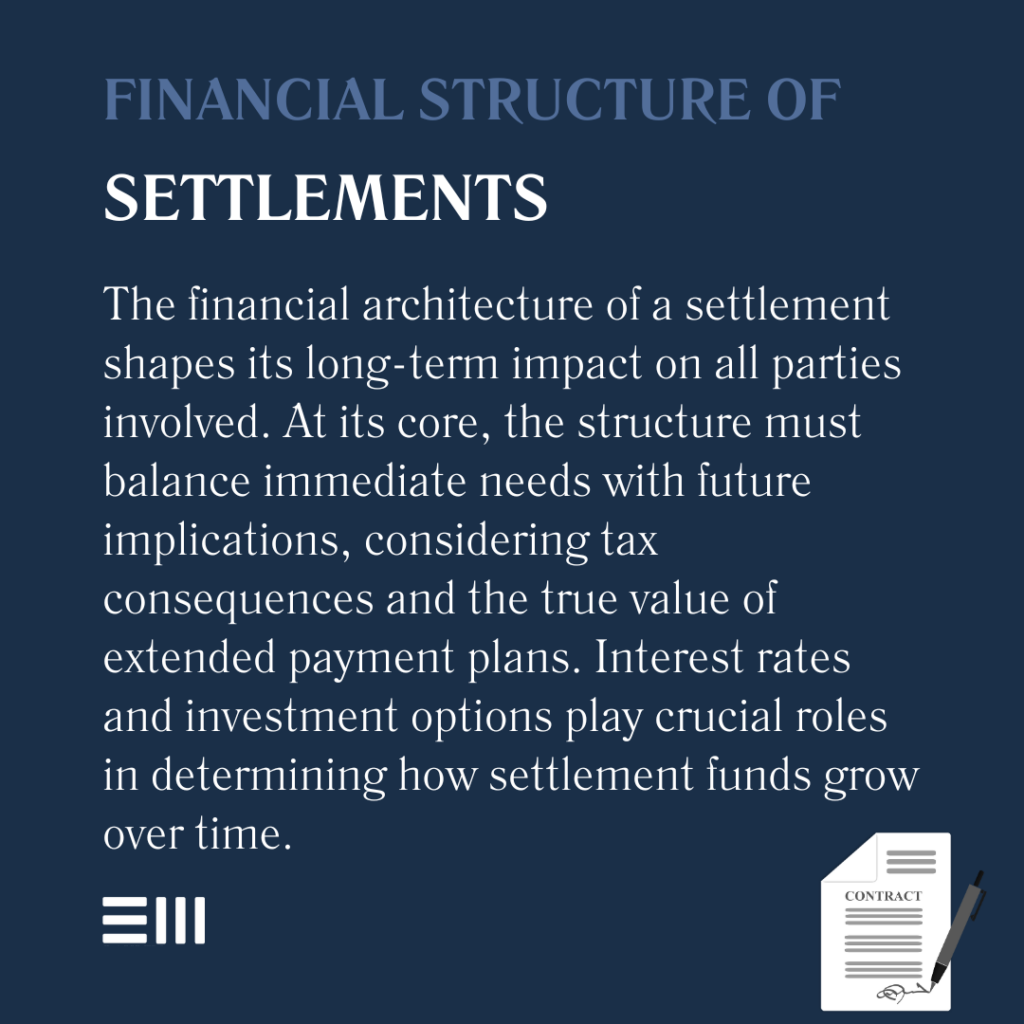
Over 95% of civil cases settle before trial, yet a single misstep in settlement negotiations can cost clients millions.
In Alabama courtrooms, seasoned attorneys know that mastering the delicate dance of offers and counteroffers often determines whether their clients walk away satisfied or empty-handed.
The Anatomy of a Settlement Offer
Behind every successful settlement lies a carefully structured offer that balances client interests with legal realities. Each component serves a specific purpose in moving negotiations toward a favorable resolution.
Key elements of effective settlement offers include:
- Thorough documentation of all damages and supporting evidence;
- Clear terms and conditions that address all outstanding issues;
- Specific timelines for acceptance and payment arrangements;
- Detailed release provisions and confidentiality requirements;
- Consideration of tax implications and long-term consequences;
- Provisions for handling future claims or related matters; and
- Mechanisms for ensuring compliance with settlement terms.
A well-crafted initial offer sets the foundation for productive negotiations and demonstrates professional commitment to resolution.

Strategic Timing in Settlement Negotiations
The moment when an offer is presented can be as critical as its content. Understanding when to initiate settlement discussions requires careful analysis of numerous factors.
Important timing considerations include:
- Status of discovery and available evidence;
- Approaching deadlines or court dates;
- Changes in parties’ circumstances or positions;
- Market conditions and economic factors;
- Availability of key witnesses or evidence;
- Statute of limitations concerns;
- Judicial calendar and court backlog; and
- Party readiness for meaningful negotiations.
Proper timing can significantly impact the likelihood of reaching a favorable settlement agreement.
Crafting Effective Counteroffers
Counteroffers require a delicate balance between advancing your position and maintaining productive dialogue. Understanding how to respond strategically to initial offers often determines negotiation success.
Essential elements of successful counteroffers include:
- Detailed justification for proposed changes;
- Creative solutions to bridge significant gaps;
- Alternative approaches to contentious issues;
- Clear prioritization of critical terms;
- Reasonable compromises on less essential points;
- Professional tone that maintains relationships;
- Documentation supporting counteroffer positions; and
- Flexibility in payment terms or timing.
Each counteroffer should move negotiations closer to resolution while preserving important client interests.
The Role of Alternative Dispute Resolution
ADR methods often provide valuable frameworks for settlement negotiations, offering structured environments for productive discussions.
Key ADR considerations include:
- Mediation timing and mediator selection;
- Arbitration options and limitations;
- Early neutral evaluation benefits;
- Mini-trial possibilities;
- Summary jury trial considerations;
- Settlement conference preparation;
- Hybrid ADR approaches; and
- Cost-benefit analysis of various methods.
Alternative dispute resolution can provide efficient paths to settlement when traditional negotiations stall.
Psychological Elements of Negotiation
Understanding human behavior and decision-making patterns plays a vital role in successful settlement negotiations. The psychological dynamics between parties often influence outcomes as much as legal or financial factors.
Critical psychological factors include:
- Anchoring effects from initial offers and their impact on final outcomes;
- Loss aversion tendencies and their influence on risk assessment;
- Reciprocity principles in concession-making;
- Confirmation bias in evaluating settlement options;
- Status quo bias affecting settlement resistance;
- Escalation of commitment in prolonged negotiations;
- Social proof influence on decision-making; and
- Framing effects on offer perception.
These psychological insights help negotiators anticipate reactions and plan more effective strategies.
Documentation and Record-Keeping
Proper documentation throughout settlement negotiations protects all parties and ensures clear understanding of agreements. Maintaining detailed records proves essential for both current negotiations and potential future disputes.
Essential documentation practices include:
- Written confirmation of all verbal discussions;
- Timestamped correspondence records;
- Draft agreement versions with tracked changes;
- Supporting evidence and calculations;
- Expert opinions and evaluations;
- Meeting minutes and attendance records;
- Authority verification documentation; and
- Settlement implementation timelines.
Thorough documentation helps prevent misunderstandings and provides crucial evidence if disputes arise.
Digital Tools in Modern Settlement Negotiations
Technology has transformed how parties approach settlement negotiations, introducing new tools and methodologies for reaching agreements efficiently.
Key technological considerations include:
- Virtual negotiation platforms and their capabilities;
- Electronic document exchange systems;
- Digital signature requirements and validity;
- Online dispute resolution tools;
- Settlement calculation software;
- Risk assessment algorithms;
- Communication encryption methods; and
- Cloud-based document management.
These digital tools can streamline negotiations while ensuring security and compliance.
Financial Considerations in Settlement Structuring
Understanding the financial implications of different settlement structures helps parties make informed decisions about their options.
Important financial factors include:
- Tax consequences of various payment structures;
- Present value calculations for extended payments;
- Interest rate considerations in payment plans;
- Insurance coverage implications;
- Investment options for settlement funds;
- Bankruptcy considerations and protections;
- Estate planning implications; and
- Future value projections.
Proper financial structuring can significantly impact the long-term value of settlement agreements.

Special Circumstances Affecting Settlements
Certain situations require additional considerations during settlement negotiations to ensure all parties’ interests are protected.
Special circumstances include:
- Minor or incapacitated party involvement;
- Government entity participation;
- Multiple insurance carrier coordination;
- International party considerations;
- Public policy implications;
- Class action settlements;
- Regulatory compliance requirements; and
- Environmental impact concerns.
Understanding these special circumstances helps negotiate more comprehensive agreements.
Post-Settlement Implementation
The period following the settlement agreement requires careful attention to ensure proper implementation and compliance with all terms.
Critical post-settlement steps include:
- Payment schedule monitoring;
- Release documentation execution;
- Confidentiality compliance verification;
- Dismissal filing coordination;
- Insurance claim processing;
- Tax reporting compliance;
- Settlement fund distribution; and
- Future claims handling procedures.
Proper implementation ensures settlement benefits are fully realized.
Common Questions About Settlement Negotiations in Alabama
Understanding the nuances of settlement negotiations helps parties navigate this complex process more effectively.
Here are answers to frequently asked questions that arise during settlement negotiations in Alabama.
What Makes an Offer Legally Binding?
A valid settlement offer must include clear terms, consideration, and demonstrate mutual intent to be bound by the agreement.
When Should We Consider Multiple Party Settlements?
Complex cases involving multiple defendants often benefit from global settlement approaches that resolve all claims simultaneously.
How Are Confidentiality Terms Enforced?
Settlement agreements typically include specific enforcement provisions and liquidated damages clauses for confidentiality breaches.
What Happens if a Settlement Agreement is Breached?
Breach remedies can include monetary damages, specific performance requirements, or revival of original claims.
Securing Your Settlement Success
Let our experienced negotiation team guide you through the settlement process with strategic precision. Our deep understanding of Alabama settlement dynamics can help maximize your potential for a favorable resolution.
Contact Baxley Maniscalco today to discuss your settlement goals and develop a winning negotiation strategy that protects your interests.
Can't find what you're looking for? Search our site below.










